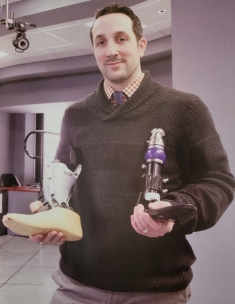The Bionic Veteran: Evaluating the Biomechanics of Limb Loss

Jason Maikos, PhD
Veterans Affairs New York Harbor Healthcare System
Abstract: Veterans with lower limb loss face a wide spectrum of challenges that affect their mobility and autonomy. Dr. Jason Maikos, Director of the VISN 2 BRAVO Laboratory at the Department of Veterans Affairs, utilizes complex analytical methods that explore both cutting edge prosthetic technology and rehabilitation treatments, with the goal of determining the best practices to maximize our disabled Veterans’ rehabilitative and functional potential. Part 1 of this seminar will explore the biomechanics of the prosthetic socket-residual limb interface. There is a substantial gap in our understanding of the complex mechanics of the residual limb-socket interface during dynamic activities that limit the ability to improve prosthetic socket design. We use various imaging data sources to aid in the development of new methods and techniques to enhance prosthetic fit that have the potential to reduce secondary physical comorbidities and degenerative changes that result from complications of poor prosthetic load transmission. Part 2 of this seminar explores the evaluation of advanced prosthetic ankle-foot devices through biomechanical, functional, and subjective measures with a goal to improve lower limb loss prescription algorithms. More specifically, we aim to provide a strong scientific basis to the guidelines used in prescribing prosthetics to facilitate maximal functional ability and user satisfaction. Ultimately, Dr. Jason Maikos and the VISN 2 BRAVO Laboratory aim to develop evidence-based conclusions that can be appropriately and efficiently translated into limb loss clinical practice to maximize our Veterans’ rehabilitative and functional potential.
Biography: Dr. Jason Maikos is the inaugural Director of the VISN 2 Biomechanics Research for the Advancement of Veteran Outcomes (BRAVO) Laboratory at Veterans Affairs New York Harbor Healthcare System. He is a proud graduate of the Rutgers School of Engineering where he earned his doctoral degree in biomedical engineering and also survived the Shreiber-Lab experience. In his current role at VA, Dr. Maikos has a diverse portfolio of research funding, which examines advanced prosthetic devices and limb loss care. His research focuses on multi-site, multi-disciplinary human clinical trials, and specifically utilizes complex analytical methods that explore both cutting edge prosthetic technology and rehabilitation treatments, with the goal of determining the best practices to maximize our disabled Veterans’ rehabilitative and functional potential. He leads several limb loss-focused grants, including an examination of prosthetic prescription practices of advanced technologies, the long-term effects of utilizing a powered ankle-foot prosthesis for individuals with limb loss, and the biomechanics of the prosthetic socket-residual limb interface. In 2018, Dr. Maikos was named the New York Federal Executive Board, Federal Employee of the Year for his work in leading the evolution of limb loss care in VA. In 2022, Dr. Maikos returned to Rutgers as a part-time lecturer to teach an undergraduate elective course in prosthetics and was recently appointed to the graduate faculty for the Department of Biomedical Engineering. His BME senior design teams have won back-to-back “best in class” projects and he looks forward to defending his title again this year. Dr. Maikos lives in Holmdel, NJ with his wife Patricia, son Lincoln, and rescue dog, Shortstop. In his free time, he cheers for the Howell Hurricanes baseball team and the NJ 87s youth hockey team.